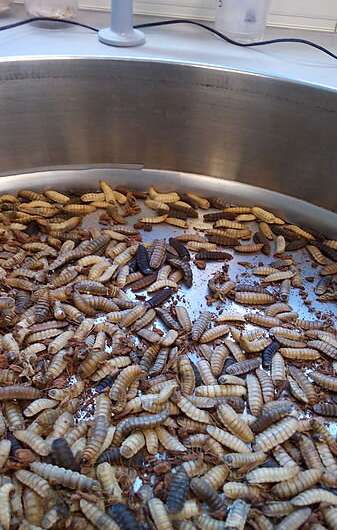This article has been reviewed according to Science X's editorial process and policies. Editors have highlighted the following attributes while ensuring the content's credibility:
fact-checked
peer-reviewed publication
trusted source
proofread
How soldier fly larvae could reduce food waste

They say an army marches on its stomach, but an army of soldier fly larvae mashes food waste into compost. New work in the International Journal of Environment and Waste Management could help in the fight to mitigate the growing problem of food waste from restaurants, fast food establishments, and other eateries.
It is difficult to obtain precise figures on the generation of food waste worldwide, but it is estimated that the global food service industry generates billions of tons of food waste each year. Much of this waste is fed into landfills, where it simply contributes to greenhouse gas emissions and other environmental problems.
Ideally, reducing food waste across the industry would be an important step in addressing global food insecurity and reducing the environmental impact of food production. However, there will always be some food waste regardless of our best efforts to minimize waste. Some might be suitable for conversion into raw materials for biofuel production, but much of the waste could benefit from efficient processing into compost for farming and gardening.
A. Jamilah, K.A. Irfana, A.J. Nurul Ain, N.M. Nur Aimi, A.B. Noor Ezlin, and A. Mohd Reza of the Universiti Kebangsaan Malaysia in Selangor have investigated the potential of larvae of the Black Soldier Fly, Hermetia illucens, to break down food waste from cafeterias into useful compost for agriculture. The team carried out studies on uncooked food waste, cooked general food waste, and cooked vegetable-only food waste.
They found that the larvae could convert all of the available food waste offered to them within twelve days at which point they enter the pre-pupation state and stop feeding. The raw vegetable-only waste led to the greatest growth of the larvae compared with the other two classifications of food waste. However, the team found that larval growth in these scenarios was slower and less than that seen with this species raised on chicken guano. Nevertheless, there is potential for the efficient processing of vegetable waste into compost materials by this species.
More information: Noor Ezlin Ahmad Basri et al, Composting of food wastes by using black soldier fly larvae, International Journal of Environment and Waste Management (2022). DOI: 10.1504/IJEWM.2022.10037272
Journal information: International Journal of Environment and Waste Management
Provided by Inderscience





















